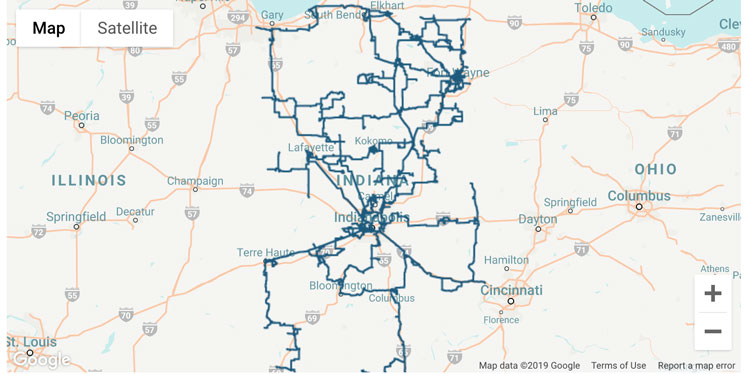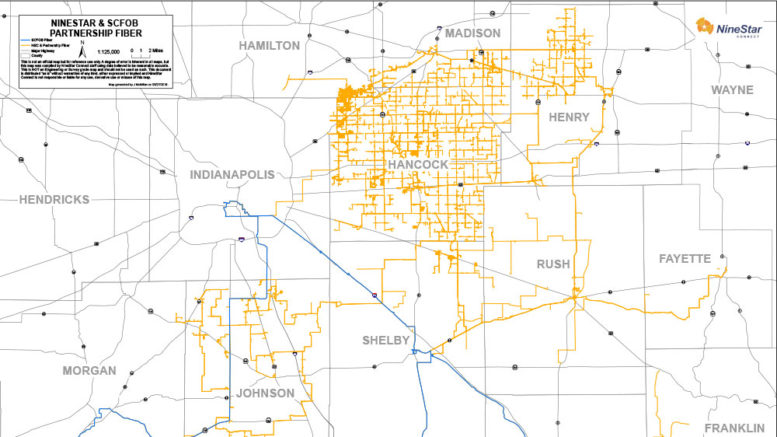In Hamilton County, if you live outside Carmel, Fishers, Noblesville or Westfield, you may not have an option for truly high-speed internet in your home or business. NineStar Connect and Intelligent Fiber Network are two cooperative that are working to bring fiber-optic gigabit internet service to rural and underserved areas across Indiana.
The Reporter recently spoke with Jill Snyder from NineStar Connect about how rural fiber internet connections and building new cell phone towers can be two sides of the same coin.

Snyder
“NineStar is a non-for-profit cooperative owned by our members,” Snyder said. “We are a broadband fiber, water, electric and sewer cooperative. This particular story involves that broadband fiber, which brings us our wonderful multiple gigabit internet access.”
NineStar Connect works with a company called Intelligent Fiber Network (IFN), a state-wide fiber provider. Like NineStar, IFN is also a cooperative.
When major cell providers want to build a new cell tower in order to expand their coverage area, they need someone to provide the fiber connection from the tower back to their aggregation point. This often involves cell providers putting out a request for proposal (RFP) in order to identify companies best suited to lay the fiber. This is where NineStar can step in, thanks to IFN.
According to Snyder, whenever NineStar bids on putting puts fiber to a cell tower, they only bid on how much it will cost to provide fiber connection to the cell tower itself. When they win the bid, they build in service to everyone on the way to the cell tower – all the residential customers and businesses – at their own expense.
“We can do that because a portion of it is being paid for by the cell provider,” Snyder said. “When rural companies like us working with IFN put in cell towers, the whole area is lifted.”

Co-ops building cell tower infrastructure can also provide fiber networks to rural Hoosiers. (Photo provided)
Areas like Freeport, Ind., have 40-gigabit synchronous fiber. They have a better connectivity than San Francisco, Calif., because NineStar and IFN were able to win the contract for some of these cell towers.
“The problem is when Verizon says, ‘Here is a contract for cell towers,’ they do 250 or 500 towers at a time,” Snyder explained. “If they put 300 of them out in an RFP (Request for Proposals), there may only be six of them in our territory. IFN can bid on the whole lot because they have broader coverage. Then NineStar Connect can get the six that are in our territory and raise the whole community.”
But there are a lot of companies that build fiber to cell phone towers. Other companies just build to the tower.
“They don’t care what they are passing along the way of anything but getting fiber to the cell tower itself,” Snyder said. “It’s not easy hooking up 20 farms along the way, but because we are not-for-profit cooperative, that’s what we do.”
NineStar and IFN’s fiber territory is always expanding. They work in areas that do not have enough population density for Comcast or AT&T to justify the investment in infrastructure for high-speed internet service.
If AT&T, Verizon, T-Mobile or Sprint would agree that just 10 percent of their cell towers will go to rural cooperatives, the impact that would have on rural broadband could be significant.
“If you are in an REMC or if you have a rural telecom, contact them and encourage them to work with IFN,” Snyder said. “If more REMCs and local phone companies start working with IFN and they can start bidding on more of the towers, then we can make a big impact on rural internet service. We are not asking AT&T or Verizon or Sprint to pay any more to get to the tower. We bid competitively. We just need them to take the effort to bid the towers out in smaller packages. Or if our price quote is within, say, 2 percent, then give the deal to the cooperative. If they would just make a conscious effort, then as lot of the rural broadband problems could be solved.”
For economic development, any business that would be inclined to move into a rural area needs high-speed internet. Without it, they will look elsewhere.
IFN relocates Indianapolis headquarters to accommodate growth
Intelligent Fiber Network (IFN), a leader among Indiana’s commercial fiber broadband providers, recently announced the relocation of its headquarters to the west side of Indianapolis to accommodate for continued growth. This announcement follows IFN’s successful $13 million capital raise in April 2019.
IFN’s fiber-optic backbone connects telecommunications companies, hospitals, schools and government facilities via 4,500 route miles of fiberline across more than 60 Indiana counties, including Hamilton County. The relocation of its headquarters to the west side of Indianapolis allows for continued growth.

Graphic provided
The new headquarters, located at 722 N. High School Road, provides the company with 38,000 square feet of office, meeting and server space. Previously owned by Wabash Valley Power Alliance (WVPA), the building has proved to be an ideal location to house IFN and its growing partnerships. WVPA joined IFN as its newest member/owner this spring.
“We are continuing to see strong growth in our business as we invest in more fiber assets for our customers. With the growth in revenue and assets comes the need for additional staff,” said IFN CEO Jim Turner. “We’ve expanded our in-house staff by nearly 50 percent over the past two and a half years, and we were out of space for our current employees, let alone for future growth. We are excited to be moving to a building that accommodates that growth and provides other opportunities to support our owners and partners.”
Since IFN’s founding by a group of independent rural telephone companies in 2002, the company has grown steadily. Today, IFN’s fiber-optic backbone connects telecommunications companies, hospitals, schools and government facilities via 4,500 route miles of fiberline across more than 60 Indiana counties and extends to Chicago and Louisville.
Renovations to the new headquarters building are underway, with an anticipated ribbon cutting on the complete facility in the summer of 2020. IFN’s data centers on Henry Street and at 5520 W. 76th St. will remain the company’s central connection hub, and the move will not impact service at these locations.
In the past two years, IFN has announced multi-million dollar investments on infrastructure and network upgrades across the state to increase capacity, improve stability, and add operational and network efficiency. This year, five of its owner companies and one of its owner’s member companies were awarded $21.7 million in funding from Indiana’s Next Level Connections Broadband Grant Program.
About Intelligent Fiber Network
Intelligent Fiber Network (IFN) is owned by 20 Indiana local exchange telephone companies and one rural electric cooperative. IFN provides high-speed fiber-optic backbone capabilities to these owners as well as to other telecommunications providers and business direct customers including hospitals, schools and government facilities. IFN offers commercial service in Indiana and throughout the U.S. via a network of national partners. For more information, visit intelligentfiber.com or call (866) 406-4636.

